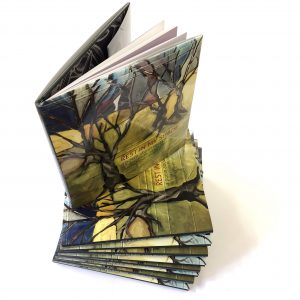This Week in Palestine has chosen “Rest In My Shade” as Book of the Month!
Review by Ata R. Hindi.
“I met Nora Lester Murad one day in a café in Ramallah. I remember my coffee. Black. We spent over an hour discussing the illegality of the blockade of Gaza. We spoke about the role of states and international actors in perpetuating that blockade. We spoke about ways to change it. That was the first of many meetings and, a few years later, not much has changed. It seems that this is the motto of the Palestinian cause: Not much has changed.
We wonder – do they not see us?
Fast forward to last week. It was an absolute privilege to be given the opportunity to review Rest in My Shade. The book consists of a poem written by Nora Lester Murad and Danna Masad and features the work of Palestinian artists.
Olive trees adorn the cover – a message of hope with a cascade of colors in its leaves. The dedication – a shout-out: “For refugees and displaced people everywhere.” It is a fitting message of solidarity from a people who long for home.
The poem begins with an olive pit. A narrative not unlike the extraordinary wordplay of the contemporary Palestinian poet. A series of symbols and personifications that revolve around Palestine and the Palestinian people. It is a poem of our growth and our struggle. It is a reminder of our roots as Palestinians through strokes of the pen and the paintbrush.
The poem’s olive tree is one of many. It lives through a history of war, despair, love, anger, and fear. It is taken away from its home. After its journey, it is put on display. Void of its meaning – and perhaps its identity. It is forgotten. It longs for home.

This past olive season, I was part of the diaspora again. My family owns a wealth of olive trees just outside Jerusalem. My ancestors were fellahin – as are we. Our olive tree wealth was greater before they came and stole our land. They built on that land a highway for themselves and put up walls. When they razed the olive trees, they left one standing. I will never forget it.
I could not join the olive harvest this time. I longed for home.
The poem ends with a call. The olive tree calls to us – its young and its children. “May people rest in my shade and be home.”
This beautiful poem is interspersed with the work of Palestinians artists. A beautiful mix of styles – from photos to oil to pastel – a cultural collection of Palestine and the Palestinian people. The olive trees, the families, and the keffiyehs. The words and the art belong to each other like the olive tree and its soil.
“I was more,” says the olive tree. Those are Palestinian words. They are words of longing and despair.”
Read Ata R. Hindi’s full review here at This Week in Palestine.